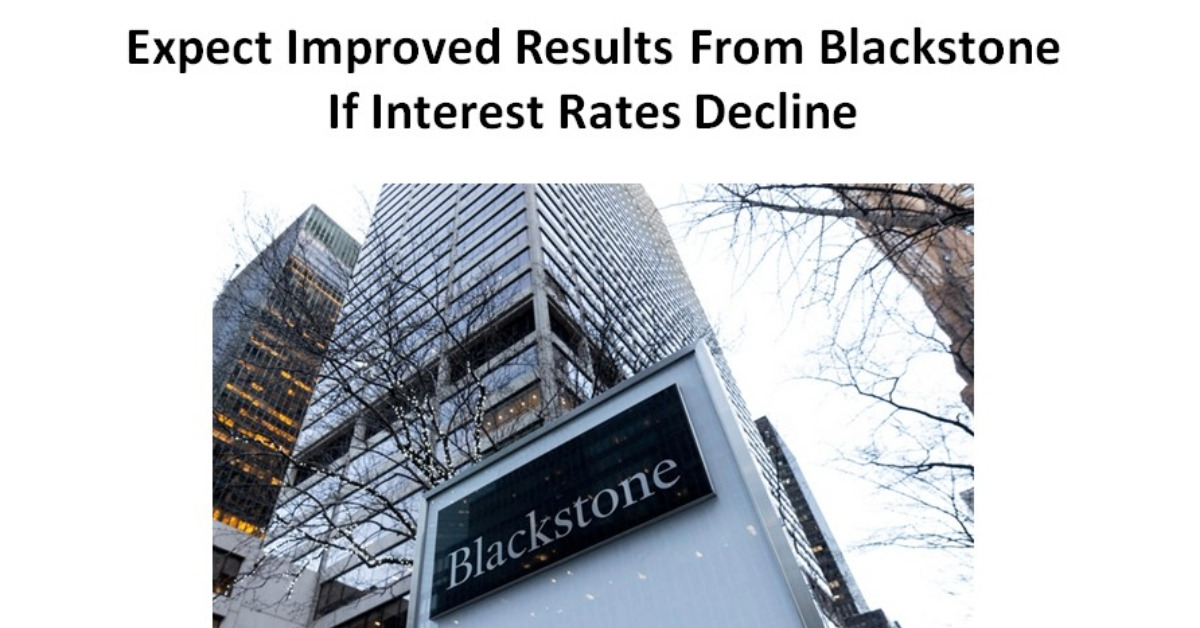
I last reviewed Blackstone (BX) in this January 26 post at which time it had just released its Q4 and FY2023 results. Now that BX has released its Q1 2024 results on April 18, I take this opportunity to revisit this existing holding. Based on my analysis, I expect improved results from Blackstone if interest rates decline.
The asset manager industry is highly fragmented and many asset managers should not, for a variety of reasons, even exist.
One of the conclusions in PwC’s ‘2023 Global Asset and Wealth Management Survey‘ is that ~1 in 6 asset and wealth management companies globally are likely to disappear or be acquired by 2027; this is twice the normal turnover rate.
The survey of 250 asset managers and 250 institutional investors paints the picture of an industry grappling with a set of challenges:
- digital transformation;
- shifting investor expectations; and
- consolidation.
As a result, 73% of asset managers are considering a strategic consolidation with another asset manager to:
- gain access to new segments;
- build market share; and
- mitigate risks.
Firms are also turning to technology to transform; more than 90% of asset managers already use disruptive technological tools (including big data, AI and blockchain) to enhance investment performance.
While many asset managers will cease to exist over the coming years, BX is is poised to benefit from inevitable industry consolidation. Over the course of the last few decades, it has evolved to become one of the world’s largest asset managers. This presents it with investment opportunities most asset managers can’t even remotely consider.
To put things in even greater perspective, BX’s Strategic Partners unit recently sold a $1.1B portfolio of private equity fund interests to Ares Management Corp..
Strategic Partners, has $69B of assets under management (AUM) and about 5,500 of acquired limited partnership interests. On the other hand, this is the largest private equity deal completed by Ares’ secondaries group which ‘only’ has ~$24.8B of assets. This transaction was a rounding error for BX but meaningful to Ares.
Business Overview
I encourage you to review the company’s website and Part 1 of the FY2023 Form 10-K.
The ‘Our Businesses‘ section of BX’s website has a menu of the areas in which BX invests. Over the years, it has established an unparalleled global platform of leading business lines, offering over 70 distinct investment strategies.
In addition, this April 18 interview with BX President Jon Gray is worth a listen. Gray explains why, as highly sophisticated and opportunistic investors, BX has been aggressively acquiring real estate. BX seeks to acquire assets at a discount to fair value and then to make improvements to create additional value and earn attractive investment returns. In essence, BX needs to ‘zig’ while others ‘zag’; the time to acquire attractive assets is when many other investors are reluctant to do so.
Recently, BX announced plans to acquire Apartment Income REIT (AIRC) in a $10B transaction valued at a ~25% premium to AIRC’s recent share price.
In addition to this acquisition, in 2023 BX paid a 30% premium to acquire Tricon Residential (TCN) in a $3.5B transaction.
Prior to these two acquisitions, BX acquired another ~$30B worth of REITs which included:
- Preferred Apartment REIT
- American Campus Communities
- Industrials REIT
- PS Business Parks
All these acquisitions have been made during a period in which many investors have become reluctant to be acquisitive.
The window of opportunity, however, may be closing and if interest rates become lower a year from now, real estate valuations may not be as attractive as they have been in the last couple of years. This will make it increasingly difficult to acquire, for example, economically feasible apartment communities.
BX continues to exceed $1T in total Assets Under Management (AUM). It achieved this level more than 3 years ahead of the aspirational road map presented at the 2018 Investor Day.
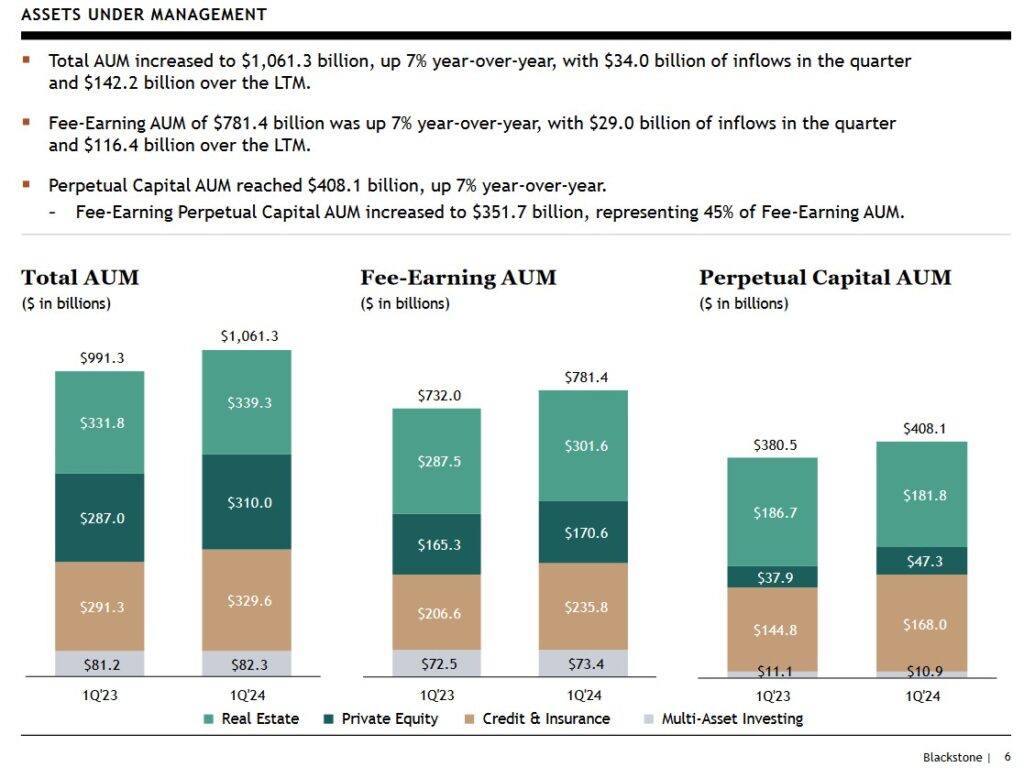
Source: BX – Q1 2024 Earnings Presentation
Financials
Q1 2024 Results
On the Q1 2024 earnings call, Stephen Schwarzman (Chairman, CEO & Co-Founder) stated:
Despite the recent U.S. CPI readings, we are seeing a decelerating wage growth and minimal input cost increases across many of our companies. In real estate, we see shelter costs moderating, contrary to government data. We believe inflation will trend lower this year, although the pace of decline has slowed recently. Geopolitical turbulence, including wars in the Middle East and Ukraine, adds further uncertainty to the business environment. And 2024 is a major election year as we all know with nearly half of the world’s population going to the polls, which injects unpredictability around the future of important policies that impact the global economy. Blackstone is well positioned against this evolving backdrop.
Our portfolio is concentrated in compelling sectors, and we have the industry’s largest dry powder balance of nearly $200B to take advantage of opportunities.
The most recent results are accessible in the Press Release and Earnings Presentation and in the accompanying Supplemental Financial Data. In particular, refer to pages 22 – 24 which reflect a high-level overview of the various funds BX manages.
NOTE: It is impossible to determine what investments are held in all of BX’s funds by reading publicly available documents. All we see in BX’s earnings releases are entities with names such as BREP IV, BCP V, Energy I, BCP Asia I, etc. While BX discloses information such as the ‘committed capital’, ‘available capital’, and Net IRR of each fund, I have absolutely no idea what are the underlying investments. My investment in BX, therefore, is based primarily on the extent to which BX’s senior management and employees have ‘skin in the game’. Furthermore, BX raises pools of capital from many highly sophisticated and wealthy clients. If these clients are willing to trust that BX can continue to generate attractive long term investment returns then I am prepared to ‘follow the money’.
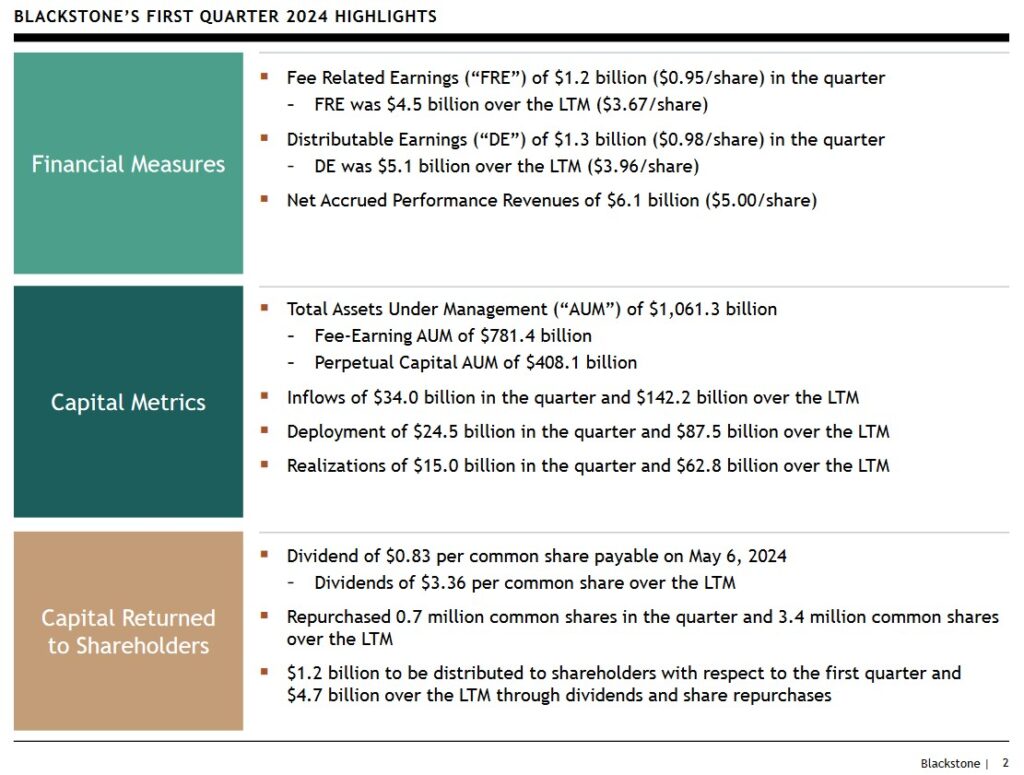
Source: BX – Q1 2024 Earnings Presentation
Higher transaction and advisory fees and higher levels of unrealized performance allocations and principal investment returns resulted in a ~167% YoY total revenue increase.
Fee-related earnings (FRE) of $1.2B in Q1 were up 11.5% YoY. This metric measures profits from revenue received on a recurring basis and not subject to future realization events.
Distributable earnings (DE) of $1.3B, or $0.98/share, in Q1 was roughly similar to $1.2B, or $0.97/share, in Q1 2023. This metric removes the effects of unrealized activity.
BX has a diverse range of growth engines that enable it to continually generate inflows, deploy capital, and generate realizations.
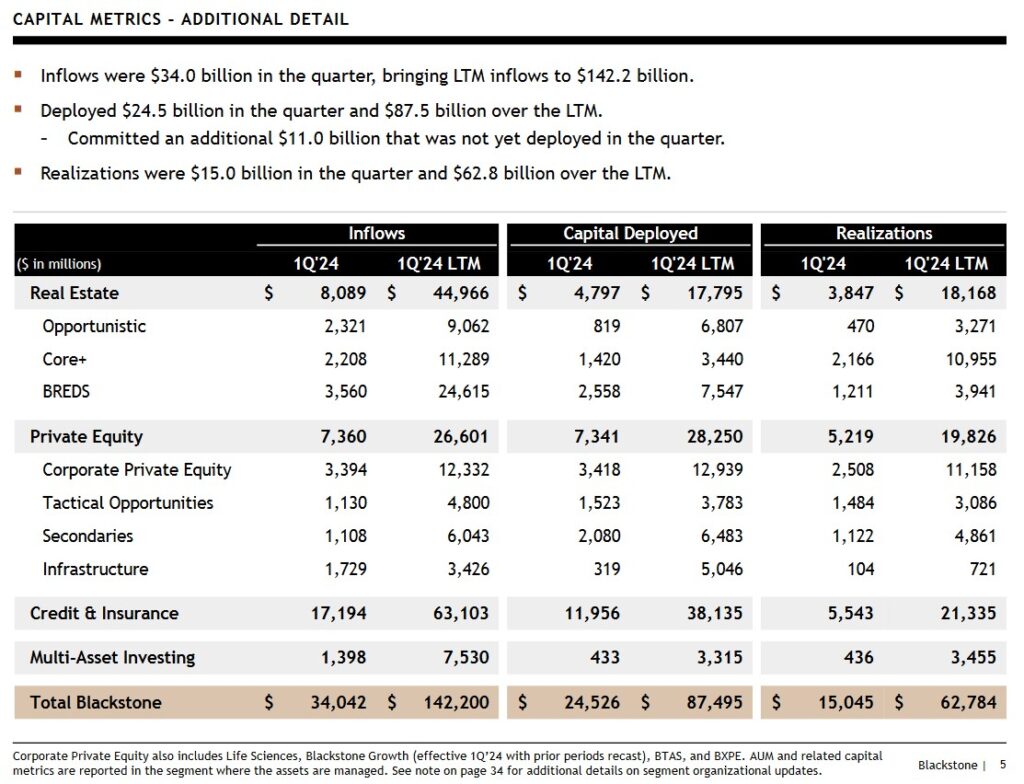
Source: BX – Q1 2024 Earnings Presentation
Credit Ratings
BX’s senior unsecured domestic long-term debt ratings are at the top of the upper-medium-grade investment-grade tier. There is no change from prior reviews.
- S&P Global assigns an A+ long-term unsecured debt credit rating with a stable outlook; and
- Fitch assigns an A+ long-term unsecured debt credit rating with a stable outlook;
These ratings define BX as having a STRONG capacity to meet its financial commitments. It is, however, somewhat more susceptible to the adverse effects of changes in circumstances and economic conditions than obligors in higher-rated categories.
These are BX’s deconsolidated Balance Sheet highlights for Q1 2024.
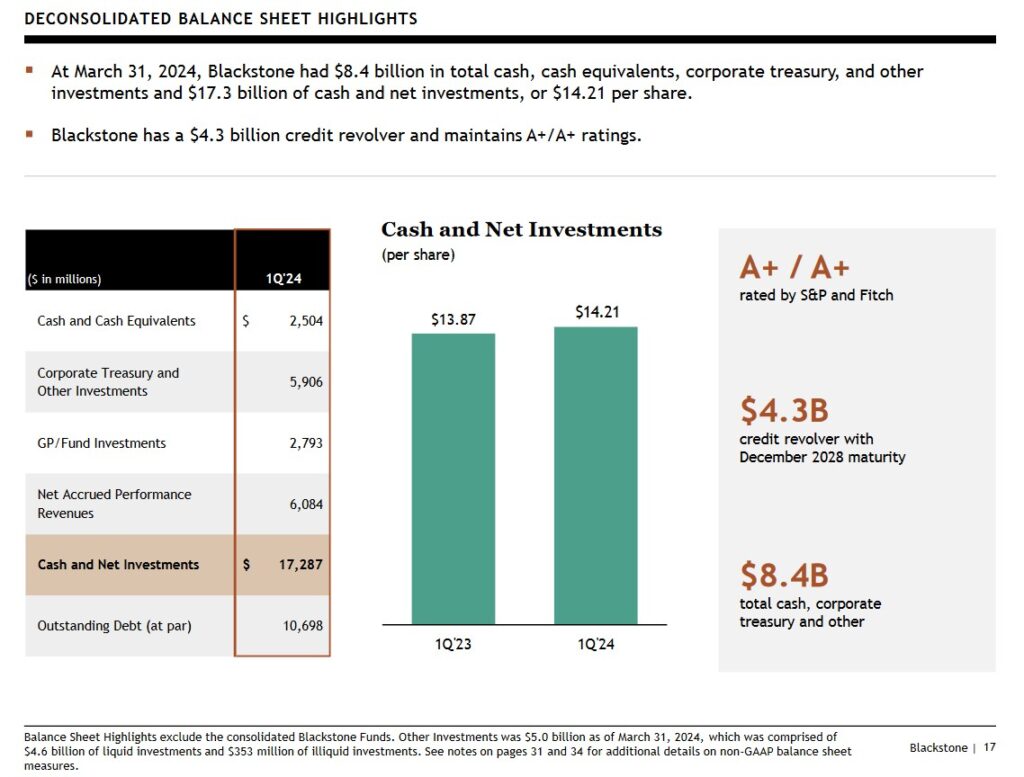
Source: BX – Q1 2024 Earnings Presentation
Dividends and Share Repurchases
Dividend and Dividend Yield
BX distributes a quarterly dividend. Its distributions are, however, unconventional and fluctuate depending on Distributable Earnings (DE). BX’s distribution policy states:
‘We intend to pay to holders of common stock a quarterly dividend representing approximately 85% of The Blackstone Group Inc.’s share of Distributable Earnings, subject to adjustment by amounts determined by our board of directors to be necessary or appropriate to provide for the conduct of our business, to make appropriate investments in our business and funds, to comply with applicable law, any of our debt instruments or other agreements, or to provide for future cash requirements such as tax-related payments, clawback obligations and dividends to shareholders for any ensuing quarter. The dividend amount could also be adjusted upward in any one quarter.’
Because BX’s quarterly dividend fluctuates, I do not calculate BX’s forward dividend yield.
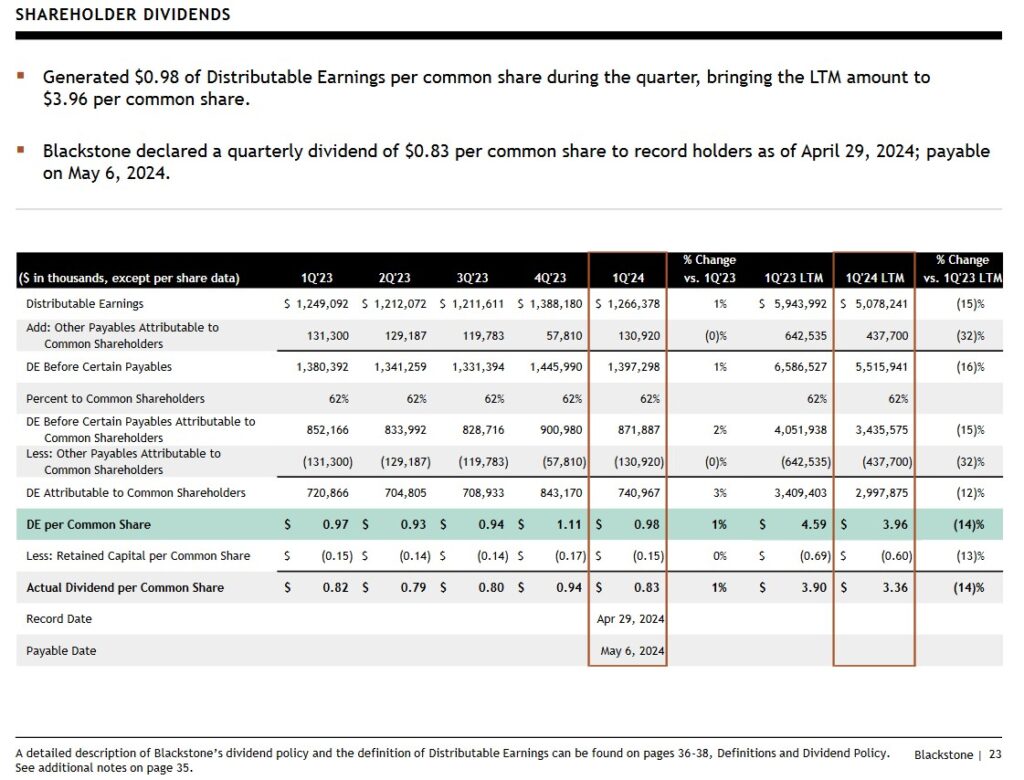
Source: BX – Q1 2024 Earnings Presentation
I look at an investment’s total potential long-term return perspective (capital gains and dividend income). Inconsistency in BX’s quarterly dividend, therefore, is irrelevant for my purposes.
Share Repurchases
BX is hyper-focused on capital allocation. The extent to which it repurchases shares depends on whether there is a meaningful deterioration in BX’s share price relative to the true underlying value.
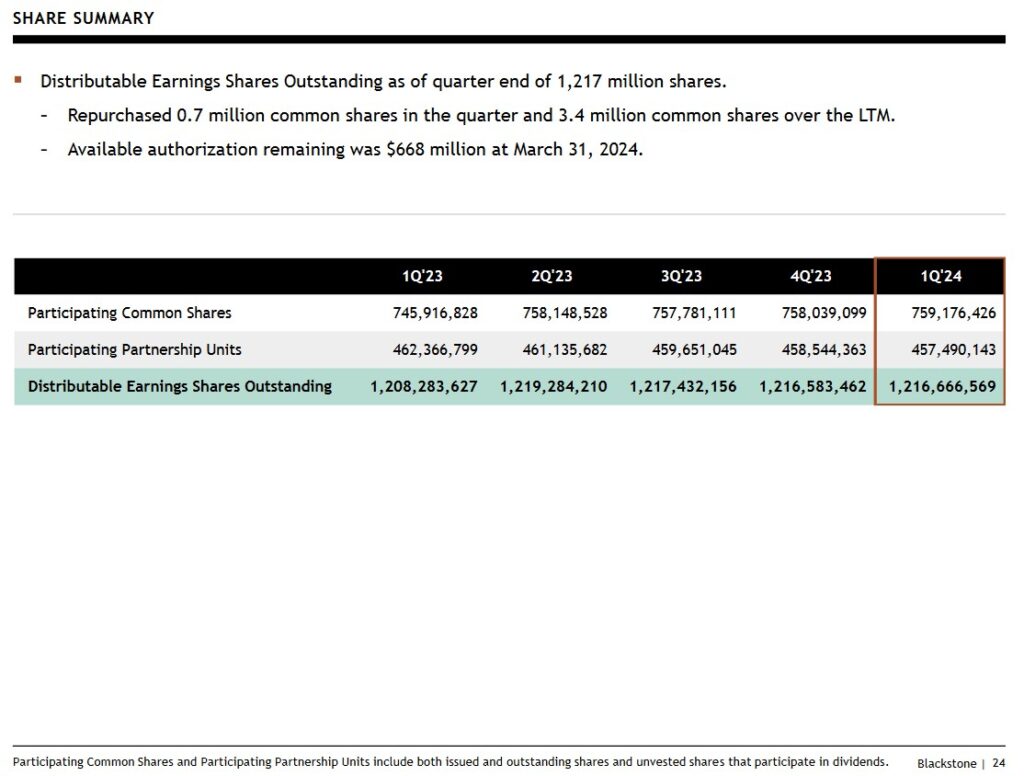
Valuation
I typically look at:
- diluted EPS;
- adjusted diluted EPS; and
- Free Cash Flow (FCF)
metrics to gauge the valuation of most companies I analyze. These metrics, however, are of little relevance when trying to assess BX’s performance and outlook.
BX uses Distributable Earnings (DE) and Fee Related Earnings (FRE) to more accurately measure its performance; these, and other terms, are defined within the FY2022 Form 10-K.
The very manner in which BX operates makes it virtually impossible to forecast them which explains why BX does not provide guidance.
BX is not easy to value because it raises large pools of capital from clients for deployment thus resulting in multiple multi-billion-dollar acquisitions annually. Because it continually makes sizable acquisitions or divestitures, earnings estimates can quickly become outdated.
Some of the assets are meant to be perpetual holdings. In other cases, BX uses its expertise to improve the performance of the companies in which it invests with the intent of monetizing these assets as part of its capital recycling programs. It is not, therefore, unusual to see wide swings in YoY GAAP results.
Fluctuations in quarterly FRE and DE are to be expected so they do not factor into my investment decision making process. I am more interested in the long-term trend of these two metrics. I, therefore, like to compare annual FRE and DE over several years.
When we compare BX’s DE and FRE for FYE 2017 – FY2023, we see a noticeable increase in recent years relative to just a few years ago.
At December 31, 2016, for example, BX had $366.6B of AUM. At the end of Q1 2024 it had $1,061.3B! As AUM grows, it stands to reason that DE and FRE should also grow over the very long-term.
Naturally, DE and FRE will fluctuate depending on market/economic conditions. If market/economic conditions are not conducive to the immediate the sale of certain assets, BX may elect to continue to manage the AUM until such time as market/economic conditions improve.
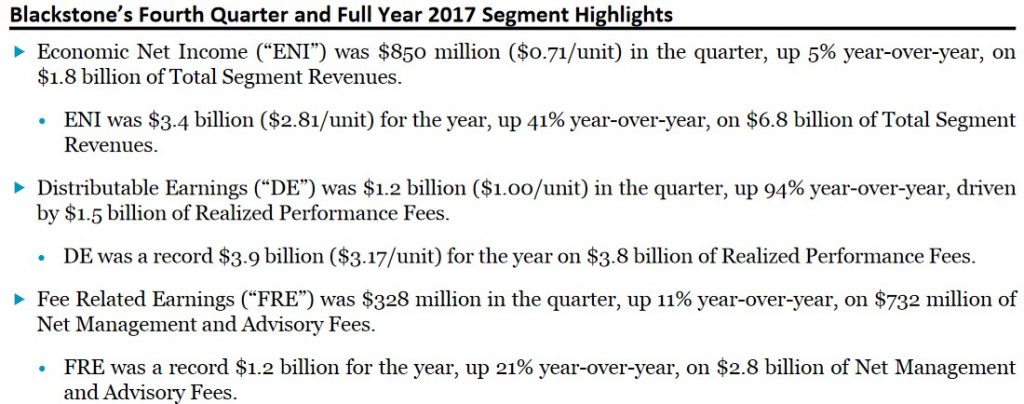
Source: BX – Q4 and FY2017 Earnings Presentation – February 1, 2018

Source: BX – Q4 and FY2018 Earnings Presentation – January 31, 2019

Source: BX – Q4 and FY2018 Earnings Presentation – January 30, 2020

Source: BX – Q4 and FY2020 Earnings Presentation – January 27, 2021

Source: BX – Q4 and FY2021 Earnings Presentation – January 27, 2022

Source: BX – Q4 and FY2022 Earnings Presentation – January 26, 2023

Source: BX – Q4 and FY2023 Earnings Presentation – January 25, 2024

Source: BX – Q1 2024 Earnings Presentation – April 18, 2024
Final Thoughts
BX continues to increase AUM from which it earns fees and there is a highly probability it could have $1.5T – $2T AUM by 2034. This bodes well for higher DE down the road.
Alternative asset exposure (eg. private equity, private debt, hedge funds, real estate, commodities, structured products, venture capital) can produce attractive long-term investment returns. Directly investing in alternative assets, however, is beyond my risk tolerance. This is why a portion of my alternative asset exposure is through BX.
Furthermore, I do not like investing in REITs because I essentially view them as ‘dead money’. I also sold off our investment properties a few years ago and no longer want to be a landlord. By investing in BX, I can have real estate exposure without having to do any work.
Having said this, investors must accept certain risks associated with a BX investment. As noted earlier, it is impossible to know what investments are held within each BX fund. Furthermore, many of the underlying assets can not be easily and quickly liquidated. BX investors must, therefore, be prepared to invest for the very long term.
My BX investment, is made on the premise that BX is in the business of making money for highly sophisticated investors. Given that wealthy investors entrust billions with BX, I am inclined to ‘follow the money’. Furthermore, senior BX executives have significant share ownership and have considerable incentive to ensure BX’s long-term success.
I currently hold 1490 BX shares in a ‘Core’ account in the FFJ Portfolio and it was my 12th largest holding when I completed my 2023 Year End FFJ Portfolio Review. Shares are held in a taxable account so as a Canadian resident I incur a 15% dividend withholding tax. Although I am not outright purchasing new BX shares, the automatic reinvestment of the quarterly dividend income results in a slight increase in my BX exposure.
I wish you much success on your journey to financial freedom!
Note: Please send any feedback, corrections, or questions to finfreejourney@gmail.com.
Disclosure: I am long BX.
Disclaimer: I do not know your circumstances and do not provide individualized advice or recommendations. I encourage you to make investment decisions by conducting your own research and due diligence. Consult your financial advisor about your specific situation.
I wrote this article myself and it expresses my own opinions. I do not receive compensation for it and have no business relationship with any company mentioned in this article.

